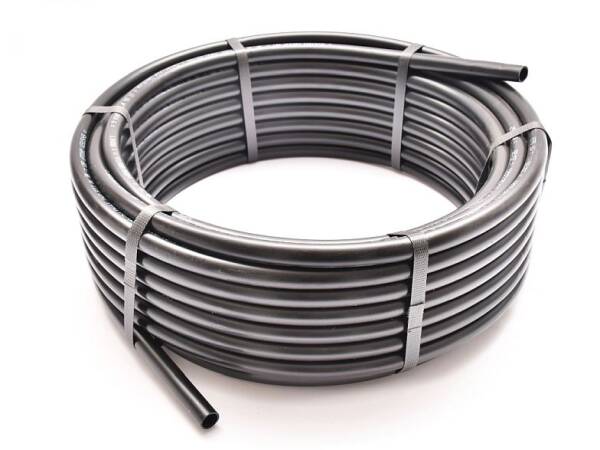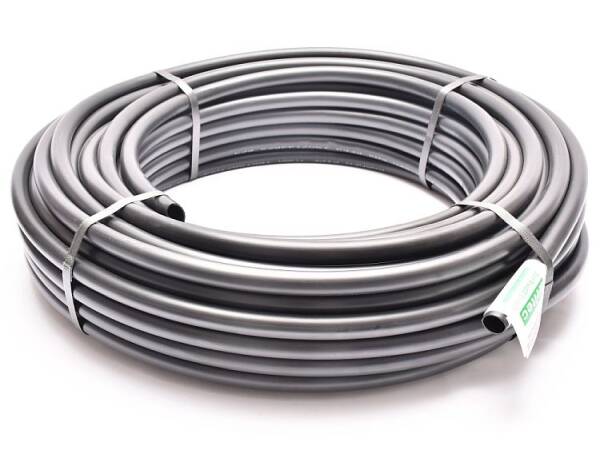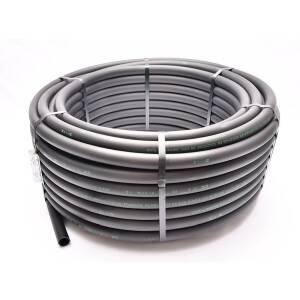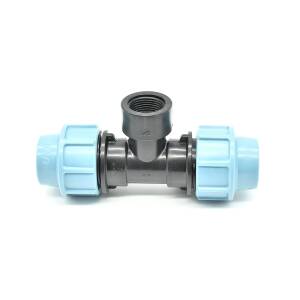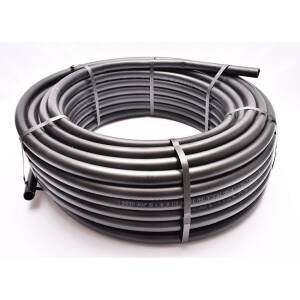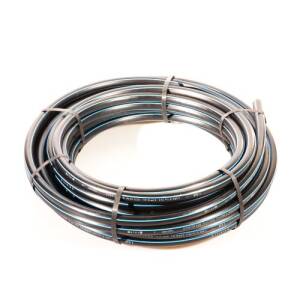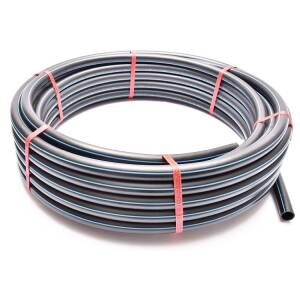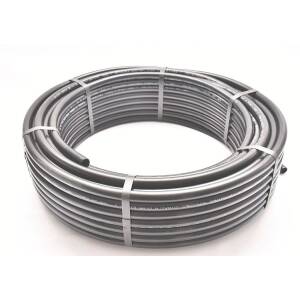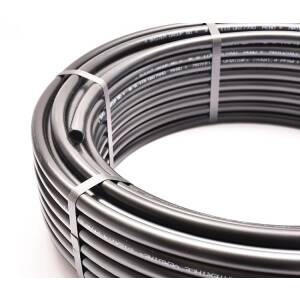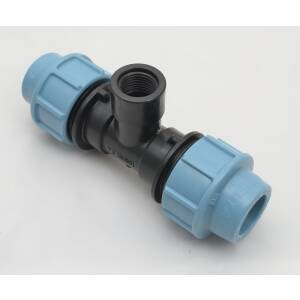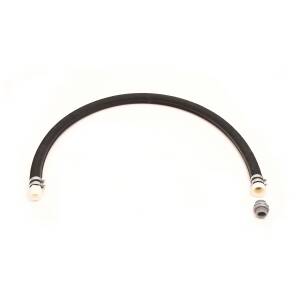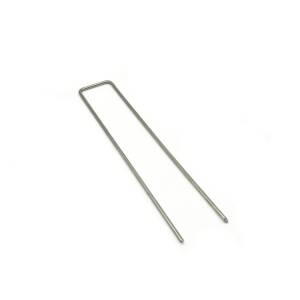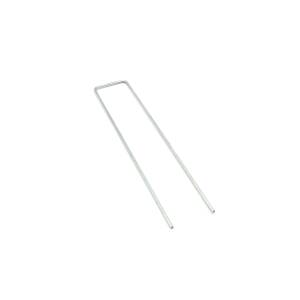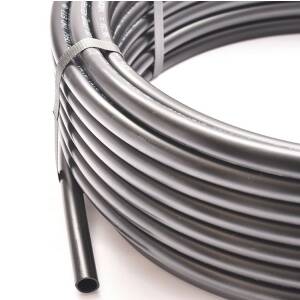Frequently Asked Questions (FAQs)
PE pipes are highly versatile. You can use them as water pipes for garden irrigation, drinking water pipes or cold water pipes in the house. They are also suitable for agricultural applications and other areas where robust piping is needed.
PE pipes can be used for drinking water pipes if they have DVGW certification. This certification ensures that the material meets the requirements of the Drinking Water Ordinance and that no harmful substances are released into the water. Without this certification, the pipes must not be used for drinking water. When purchasing, make sure that the pipes are marked accordingly. For optimal water quality, it is also recommended to integrate filters into the system.
Selecting the appropriate size depends on your requirements. For main lines, PE pipes with a diameter of 25 mm or 32 mm are suitable. In our online store, you will find rolls in different lengths, so you can choose the right length for your project.
No, PE pipes are only suitable for cold water pipes. For hot water or high-temperature pipes, you should use materials such as copper or polypropylene instead. Alternatively, HT pipes are also available, which are specially designed for draining hot waste water from dishwashers or washing machines.
PE pipes require little maintenance. Flush the pipes regularly to prevent deposits. When installing drinking water pipes, we recommend using a filter to ensure water quality.
Yes, PE pipes are ideal for supplying water to greenhouses. Thanks to their flexibility and durability, you can lay them both above and below ground. With a suitable diameter, such as 16 mm or 25 mm, you can ensure that sufficient water is provided for your plants. Combine the pipes with drip pipes or sprinkler systems to ensure even irrigation. The high compressive strength also makes PE pipes an ideal choice for greenhouses.
When laying drinking water pipes with PE pipes, you must comply with the requirements of the Drinking Water Ordinance. Among other things, this requires the use of approved materials and fittings. PE pipes are hygienic and suitable for drinking water as long as they are labeled accordingly. Make sure that no contaminants enter the pipes and install filters if necessary to ensure water quality. In addition, the pH of the water should be checked to ensure a long pipe life.
Planning and selection – the right PE pipe for every water pipe
Precise planning is the key to a successful installation of your water pipe. Consider which areas you want to supply with water and measure the required length. PE pipes with a diameter of 16 mm are suitable for efficient irrigation in the garden, while larger pipes are ideal for main lines in the house or garden. When choosing PE pipes, you should also consider the type of piping that is suitable for the technical transport of water within your water supply system.
Use the DVS irrigation planner to select the appropriate products for your project. Our range includes water pipes in different sizes, lengths and pressure ratings. With the appropriate connectors and fittings, you can put together your own individual system.
Installation made easy – How to lay PE pipes correctly
Laying PE pipes is straightforward. For underground water pipes, dig trenches about 30 cm deep and cover the pipes with soil after installation. Above ground, simply fix the pipes along flowerbeds or pavements.
Use T-pieces and fittings to connect the pipes or create branches. Make sure that the pipes are firmly connected to prevent water leakage. For drinking water pipes, you can install additional filters to ensure water quality.
Thanks to the high flexibility of the material, PE pipes can be laid easily even in difficult terrain such as slopes or uneven ground. With the right planning and installation, you can create a long-lasting and reliable water supply and efficient water transportation.
What are PE pipes?
PE pipes, also known as polyethylene pipes, are a type of plastic pipe that is characterized by its versatility and durability. These pipes are particularly popular for water pipes because they are corrosion resistant and easy to install. Polyethylene is resistant to chemical substances and can be used in a wide range of temperatures. These properties make PE pipes an ideal choice for laying water pipes in homes and gardens. Whether for watering the garden or supplying water to the house, PE pipes provide a reliable and durable solution that also meets regulations for drinking water use.
Water pipes: basics and importance
Water pipes are the backbone of any water supply, whether it's in the home or garden. They reliably transport water from the source to the taps and irrigation systems where it is needed. Proper installation and regular maintenance of water pipes are crucial to ensuring a safe and efficient water supply. This article will teach you everything you need to know about the basics and importance of water pipes. Whether you are installing a new system or maintaining an existing one, choosing the right materials and following the regulations is essential for a long-term, trouble-free water supply.
Materials for water pipes
Choosing the right material for water pipes is crucial for the longevity and efficiency of the system. There are various materials that can be used for water pipes, including copper, steel and various plastics. Especially for drinking water pipes, special regulations must be observed to ensure water quality. Plastic pipes, especially PE pipes, are an excellent choice for water pipes. They are durable, resistant to limescale and easy to install. Stainless steel pipes are more expensive, but offer a particularly long service life and are suitable for all types of water. The right choice of material depends on the specific requirements of your project, but PE pipes offer a versatile and cost-effective solution.
Why PE pipes are the perfect choice for your water pipe
PE pipes offer you numerous advantages for your water pipe. They are lightweight, pressure-resistant and durable. In addition, these plastic pipes can be flexibly laid and extended with matching fittings or T-pieces. The high quality of the material makes them resistant to temperature fluctuations and ensures a long service life.
- Versatile applications: Whether for garden irrigation, drinking water pipes or cold water pipes – PE pipes cover everything.
- Easy to lay: You can lay the pipes above ground or bury them underground out of sight.
- High-quality material: The polyethylene used is durable, resistant to environmental influences and meets the requirements of the Drinking Water Ordinance.
- Can be combined with accessories: push-fit fittings, T-pieces and valves make it easier for you to plan and install your water pipes.
With PE pipes, you can transport water efficiently while also benefiting from an unobtrusive installation.
Drinking water pipes made of PE pipe – hygienic and durable
PE pipes can be used for drinking water pipes if they have DVGW certification. This certification confirms that the material meets the strict requirements of the Drinking Water Ordinance and that no pollutants can get into the water. Therefore, when buying, make sure that the pipes are marked accordingly.
Polyethylene is hygienic, durable and resistant to corrosion. It is particularly suitable for domestic water supply and can be laid underground or in walls. When installing water pipes, it is important to ensure proper insulation to ensure both the safety of the drinking water and the efficiency of energy use. For operation, it is recommended to integrate a filter to avoid deposits and impurities.
When planning your drinking water pipe, you should adjust the diameter of the pipes to the water demand. Main lines often require larger diameters, while 16 mm pipes are ideal for branches. Installation is easy: dig trenches, lay the PE pipes in them and connect them with suitable fittings or T-pieces.
With DVGW-certified PE pipes, you get a hygienic, safe and long-term solution for your drinking water supply. Also, pay attention to the pH of the water to further extend the lifespan of the pipes.
PE pipes for agriculture – efficient irrigation of large areas
PE pipes are not only a popular choice in the private sector, but also in agriculture. Their stability and durability make them ideal for supplying water to large fields and irrigation systems. The combination of flexible installation and high pressure resistance allows them to be used in demanding environments.
In agriculture, PE pipes are often combined with drip pipes or sprinkler systems to ensure efficient and even water distribution. Choose pipe diameters that match the water needs of your plants and make sure that the operating pressure meets the requirements of the system. Proper installation is crucial to ensure that clean and safe water flows from the tap.
A major advantage of PE pipes in agriculture is the option to buy them in long rolls. This minimizes the number of joints and reduces the risk of leaks. Installation is easy and requires few tools, making it particularly attractive for farmers.
Environmentally friendly water pipes
When planning and installing water pipes, environmental friendliness plays an increasingly important role. Plastic pipes, such as PE pipes, are an environmentally friendly alternative to traditional materials such as copper and steel. They are not only durable, but can also be recycled, making them a sustainable choice. PE pipes are also suitable for drinking water pipes and meet the strict requirements of the Drinking Water Ordinance. By choosing environmentally friendly materials, you not only help to conserve resources, but also benefit from the practical advantages offered by these modern materials.
Safety and health in water pipes
The safety and health of water pipes are of the utmost importance. Water pipes must be installed and maintained in such a way that they do not release any harmful substances into the drinking water. The German Drinking Water Ordinance sets strict limits to ensure water quality. For example, the copper content in drinking water must not exceed two milligrams per liter. It is therefore important that the water pipes are laid correctly and checked regularly. PE pipes that are DVGW certified provide a safe and hygienic solution for drinking water pipes. By complying with the regulations and installing them carefully, you can ensure that your water is always clean and safe.
Water pipe maintenance and repair
Regular water pipe maintenance and repair is crucial to ensuring a safe and efficient water supply. Here are some practical tips to keep your water pipes in good working order:
- Regular inspection: Check your water pipes regularly for leaks and visible damage. Early detection can prevent bigger problems.
- Replace damaged pipes: Replace damaged or outdated pipes with new PE pipes to maintain the integrity of the system.
- Check seals and connections: Check seals and connections for leaks and wear. Replace seals as needed to prevent water leakage.
- Cleaning the pipes: Clean the water pipes regularly to remove deposits and impurities. This helps to maintain water quality and extend the life of the pipes.
With these simple maintenance measures, you can ensure that your water pipes are always in top working order and provide a reliable water supply.
 Free Online Irrigation-Planner
Free Online Irrigation-Planner



